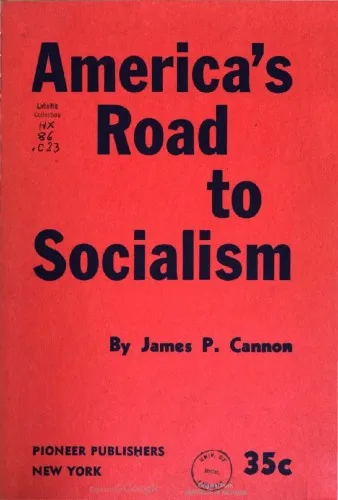America's Road to Socialism. Six Lectures Given at the Los Angeles Friday Night Forum, December, 1952--January, 1953
4.0
Reviews from our users

You Can Ask your questions from this book's AI after Login
Each download or ask from book AI costs 2 points. To earn more free points, please visit the Points Guide Page and complete some valuable actions.Related Refrences:
Introduction to "America's Road to Socialism"
James P. Cannon's "America's Road to Socialism" is a compelling exploration of the political landscape of mid-20th century America, examining the ideological battles and social movements that color the nation's march toward socialism. This book is a collection of six lectures delivered at the Los Angeles Friday Night Forum between December 1952 and January 1953, reflecting the fervor and urgency of an era fraught with political turmoil and social change. As a beacon for those seeking a nuanced understanding of socialism, Cannon's work provides profound insights into the historical forces that continue to shape America's socio-political fabric.
Detailed Summary of the Book
"America's Road to Socialism" is an in-depth examination of how socialist movements evolved in the United States, highlighting the complex interplay between economic conditions, labor struggles, and political ideologies. Cannon methodically unravels the historical context of socialist thought, beginning with the early labor struggles and extending through the challenges posed by the Cold War environment.
The series of lectures conveys an articulate narrative of America's political past, present, and potential future, punctuated by Cannon's belief in the inevitability of socialism as the logical outcome of capitalism's contradictions and failures. He discusses the key roles of the working class and labor unions in propelling political change, pointing to specific historical events and movements that illustrate the shifting dynamics between capitalist and socialist ideologies.
Key Takeaways
- The Role of the Working Class: Cannon emphasizes the importance of the proletariat as the driving force behind political transformations, asserting that the labor movement is crucial for the advent of socialism.
- Historical Context of Socialism: Understanding the socio-economic conditions and the political landscape of the past is vital in comprehending the evolution of socialist ideas in America.
- The Future of Capitalism: Cannon argues that the inherent contradictions within capitalism will inevitably lead to its demise, paving the way for a socialist society.
- Political Unity and Action: The necessity for unity among different socialist and labor groups is underscored as being paramount in effecting meaningful change.
Famous Quotes from the Book
“The road to socialism may be long and tumultuous, but its destination is certainty, rooted in the very failures of the capitalist system.”
“The working class represents the unfinished business of the American dream, a dream that only finds its fulfillment in socialism.”
Why This Book Matters
"America's Road to Socialism" is still relevant today as it elucidates the theoretical underpinnings of the socialist movement, making it an important text for those interested in understanding political ideologies. Its historical analysis offers critical insights into the socio-political conditions that continue to resonate with contemporary issues of inequality, labor rights, and economic justice.
For scholars, activists, and anyone keen on the intersection of politics and social justice, Cannon's work remains an invaluable resource. It not only charts the course of socialism in America but also challenges readers to engage critically with the ongoing discourse on capitalism and its discontents. Reading this book allows us to glean lessons from the past, preparing us for the persistent challenges and opportunities of shaping a more equitable society.
Free Direct Download
You Can Download this book after Login
Accessing books through legal platforms and public libraries not only supports the rights of authors and publishers but also contributes to the sustainability of reading culture. Before downloading, please take a moment to consider these options.
Find this book on other platforms:
WorldCat helps you find books in libraries worldwide.
See ratings, reviews, and discussions on Goodreads.
Find and buy rare or used books on AbeBooks.
1266
بازدید4.0
امتیاز50
نظر98%
رضایتReviews:
4.0
Based on 0 users review
"کیفیت چاپ عالی بود، خیلی راضیام"








